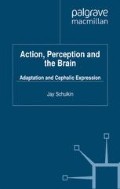Abstract
In a rich and thought-provoking paper, Lambros Malafouris argues that taking material culture seriously means to be “systematically concerned with figuring out the causal efficacy of materiality in the enactment and constitution of a cognitive system or operation” (Malafouris, 2004, p. 55). As I understand this view, there are really two intertwined claims to be established. The first is that the things beyond the skin that make up material culture (in other words, the physical objects and artifacts in which cultural networks and systems of human social relations are realized) may be essential to the enactment of, and be partly constitutive of, certain cognitive systems or operations. The consequence of establishing this claim is supposed to be that we have a mandate to recast the boundaries of the mind so as to include, as proper parts of the mind, things located beyond the skin. Thus, in talking about the contribution of the world to cognition, Malafouris (2004, p. 58) concludes that “what we have traditionally construed as an active or passive but always clearly separated external stimulus for setting a cognitive mechanism into motion, may be after all a continuous part of the machinery itself; at least ex hypothesi. ” This is the position that, in philosophical circles, is known increasingly as the extended mind hypothesis (Clark and Chalmers, 1998; Menary, forthcoming).
Access this chapter
Tax calculation will be finalised at checkout
Purchases are for personal use only
Preview
Unable to display preview. Download preview PDF.
References
Churchland, P. M. (2005). Functionalism at forty: a critical retrospective. Journal of Philosophy, 102, no. 1, 33–50.
Clark, A. (2008). Pressing the flesh: a tension in the study of the embodied, embedded mind? Philosophy and Phenomenological Research, 76, note 1, 37–59.
Clark, A., and Chalmers, D. (1998). The extended mind. Analysis, 58, no. 1, 7–19.
Dawkins, R. (1982). The Extended Phenotype: the Long Reach of the Gene. Oxford: Oxford University Press.
Di Paolo, E. A. (2005). Autopoiesis, adaptivity, teleology, agency. Phenomenology and the Cognitive Sciences, 4, no. 4, 429–52.
Mackay, W. E., Fayard, A.-L., Frobert, L., and Medini, L. (1998). Reinventing the familiar: exploring an augmented reality design space for air traffic control. In Conference Proceedings on Human Factors in Computing Systems (CHI 1998). New York: ACM Press / Addison-Wesley, pp. 558–65.
Malafouris, L. (2004). The cognitive basis of material engagement: where brain, body and culture conflate. In E. DeMarrais, C. Gosden, and C. Renfrew (Eds), Rethinking Materiality: the Engagement of Mind with the Material World. Cambridge: McDonald Institute for Archaeological Research, pp. 53–61.
Maturana, H. R. (1970). Biology of cognition. In Maturana and Varela, 1980, pp. 2–58.
Maturana, H. R., and Varela, F. J. (1980). Autopoiesis and Cognition: the Realization of the Living, Vol. 43. Dordrecht: Boston Studies in the Philosophy of Science, D. Reidel.
Menary, R. (Ed.) (Forthcoming). The Extended Mind. Aldershot: Ashgate.
Putnam, H. (1967). Psychological predicates. In W. H. Capitan, and D. D. Merrill (Eds), Art, Mind and Religion. Pittsburgh: University of Pittsburgh Press.
Rumelhart, D. E., Smolensky, P., McClelland, J. L., and Hinton, G. (1986). Schemata and sequential thought processes in PDP models. In J. L. McClelland, and D. Rumelhart (Eds). Parallel Distributed Processing: Explorations In The Microstructure Of Cognition, Vol. 2: Psychological And Biological Models. Cambridge, MA: MIT Press, pp. 7–57.
Rupert, R. (2004). Challenges to the hypothesis of extended cognition. Journal of Philosophy, 101, no. 8, 389–428.
Scott Turner, J. (2000). The Extended Organism: the Physiology of Animal-Built Structures. Cambridge, MA: Harvard University Press.
Thompson, E. (2004). Life and mind: from autopoiesis to neurophenomenology. A tribute to Francisco Varela. Phenomenology and the Cognitive Sciences, 3, 381–98.
Thompson, E. (2007). Mind in Life: Biology, Phenomenology, and the Sciences of Mind. Cambridge, MA: Harvard University Press.
Varela, F. J. (1979). Principles of Biological Autonomy. New York: Elsevier North Holland.
Varela, F. J. (1991). Organism: a meshwork of selfless selves. In A. Tauber (Ed.), Organism and the Origin of Self. Dordrecht: Kluwer Academic Publishers, pp. 79–107.
Varela, F. J., Thompson, E., and Rosch, E. (1991). The Embodied Mind: Cognitive Science and Human Experience. Cambridge, MA: MIT Press.
Weber, A., and Varela, F. J. (2002). Life after Kant: natural purposes and the autopoietic foundations of biological individuality. Phenomenology and the Cognitive Sciences, 1, 97–125.
Wheeler, M. (2005). Reconstructing the Cognitive World: the Next Step. Cambridge, MA: MIT Press.
Editor information
Editors and Affiliations
Copyright information
© 2012 Michael Wheeler
About this chapter
Cite this chapter
Wheeler, M. (2012). Minds, Things, and Materiality. In: Schulkin, J. (eds) Action, Perception and the Brain. New Directions in Philosophy and Cognitive Science. Palgrave Macmillan, London. https://doi.org/10.1057/9780230360792_7
Download citation
DOI: https://doi.org/10.1057/9780230360792_7
Publisher Name: Palgrave Macmillan, London
Print ISBN: 978-1-349-32844-4
Online ISBN: 978-0-230-36079-2
eBook Packages: Palgrave Religion & Philosophy CollectionPhilosophy and Religion (R0)

